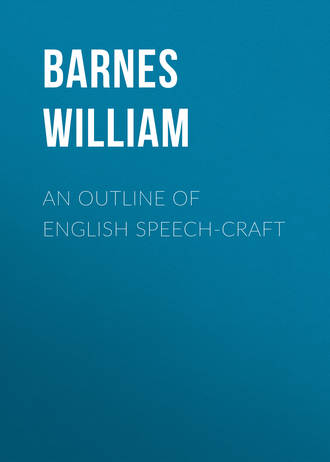 полная версия
полная версияAn Outline of English Speech-craft
Younger may mean younger reckoned from young, or younger reckoned from old; as ‘Alfred at 80 is younger than Edward at 85.’ In this case we may well say less old.
Worse (wyrse) is shapen from wo, wa, we, a stub-root which means wrong, atwist, bad in any way, and is our woe.
The r in weor is most likely of a forstrengthening and not a comparative meaning —weor, wyr, very bad; weorer, wyrer, still more strongly bad. But, not to double the r, men might have put a strengthening s, and so had weors.
TIME-TAKING
You cannot behold a thing in your mind otherwise than in or under some doing or in some form of being.
Every case of being or doing is a taking of time, as ‘the lily is white,’ ‘the man strikes,’ ‘the bird flies or was hit.’ For though the being white, or the striking or flying or hitting was only for the twinkling of an eye, it took time; for the eyelid takes time, however short it may be, to flit down and up over the eyeball. Thence the word commonly called the verb may be called the Time-taking word or Time-word, as it is called by the Germans Das Zeitwort; or, as it is the main word of the thought and speech, it is the Thought-word or Speech-word; or, as it is called in Latin and other tongues, the Word.
Welsh speech-lore has called the verb the soul1 of the thought-wording.
Among the thousands of sundriness of time-taking there are some wide differences which should be borne in mind.
Unoutreaching or Intransitive.
Time-takings, which must or may end with the time-taking thing, as
To be. John cannot be another man.
To sleep; to walk. John cannot sleep or walk another man.
Outreaching (Transitive).
Time-takings that may begin with the time-taking thing, and reach out to another, as
To strike; to see. John may strike or see another man.
Time-giving.
If a man, A, takes time against another, B, as to see B, we should more truly say of B that he gives, not takes, the time which A takes.
The time-words for unoutreaching time-takings may be called Unoutreaching; of the outreaching ones, Outreaching; of the time-givings, Time-giving.
In some cases there is between the time-taking thing and the time-giving thing a middle one – the thing, tool, or matter with which the time is taken, as ‘John hit William with a stone’ or ‘a cane.’ But then, again, this wording is shortened by the putting of the name of the mid-thing as a time-word, as ‘John stoned or caned William.’ And this brings in a call for the marking of two sundry kinds of time-words – the strong or moulded, and weak or unmoulded time-words.
A time-word, when it tells a taking of time by one thing against another, is in the outreaching (active) voice– ‘John strikes the iron.’ When it tells of the giving of time, it is in the time-giving (passive) voice. When it tells of an unoutreaching time-taking it is in the middle voice.
For the causing of another thing to take time some tongues have set shapes of the time-word, as, in Hindustani, durna, to run; durāna, to make another run.
We have hardly any of such words, though such are —
Lie, lay.
Sit, set.
Rise, raise.
Time-takings for becoming or making another thing become otherwise are marked by the ending -en on the mark-word, as
To blacken.
To whiten.
Misdoing by the fore-eking mis-: —
Mistake.
Misread.
Longer-lasting time-takings marked by the ending -er, as

Short or small time-takings by endings such as
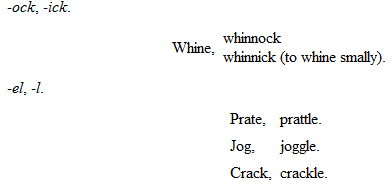
A time-taking, taken as a deed or being without any time-taking thing, is taken as a thing, and its name is a Thing-name, as to write.
As in Greek the Infinitive mood, tò gráphein, the ‘to write’; and in Italian, il scrivere, the ‘to write’ (the deed of writing or a writing), so the Infinitive mood-shape of the Saxon time-word was taken as a thing-name after the preposition to, to or for, as to huntianne (to or for the deed to hunt or hunting), as ‘Why does Alfred keep those dogs?’ ‘To huntianne.’
Thence we have our wording —
‘Any chairs to mend?’ (any chairs to or for the deed mending),
‘A house to let,’
‘Letters to write,’
‘A tale to tell,’
which is all good English.
It is an evil to our speech that the thing-shape now ending in -ing should be mistaken for the mark-word ending in -ing.
Unhappily two sundry endings of the old English have worn into one shape. They were -ung or -ing and -end.
Singung is the deed of singing, a thing. Singend is a mark-word, as in the wording ‘I have a singing bird.’
Sailing and hunting, in the foregiven thought-wordings, are thing-names, and not mark-words. Sailing is segling, as ‘ne mid seglinge ne mid rownesse’ (neither with sailing nor rowing). – Bede 5, 1.
‘Wunigende ofer hyne’ (woning [mark-word] over him). – Matt iii. 16.
‘Sy wunung heora on west’ (be their woning [thing-name] waste). – Ps. lxviii 30.
‘Ða genealaehton hym to Farisaer hyne costigende’ (then came near to him the Pharisees tempting [mark-word] him). – Matt xix. 3.
‘Ne gelaede þu us on costnunge’ (lead us not into tempting [thing-name]). – Lord’s Prayer.
So ‘haelende,’ Matt v. 23; ‘haeling’; ‘bodigende,’ Matt. x. 35; ‘bodung,’ Luke xi. 32.
‘Waere þu to-daeg, on huntunge?’ (not huntende) (wert thou to-day on or in hunting?) – Aelfric’s Dialogue.
‘Hwaet dest þu be þinre huntunge?’ (not huntende) (what dost thou by thy hunting?) – Aelfric.
‘The CALLING of assemblies I cannot away with.’ – Isa. i. 13. Not ‘calling assemblies,’ which, if calling were a mark-word, would mean assemblies that call.
The right speech-trimming with the thing-names in -ing is to trim them in the old English way as thing-names in their cases; as,
‘We are the offscouring of all things unto this day.’ – 1 Cor. iv. 13. Not ‘We are the offscouring all things.’
‘For that righteous man, IN seeing and hearing, vexed his righteous soul.’
‘By the WASHING of regeneration and (the) RENEWING of the Holy Ghost.’ – Titus iii. 5. Not ‘He saved us by the washing regeneration and renewing the Holy Ghost.’
The ending -er of the time-taker (deeder, name-word) is, not unclearly, the Celtic, Welsh gwr, or in word-welding -wr, the Latin -or; as,
Welsh, barn, doom; barnwr, a doom-man.
Latin, canto, to sing; cantor, a sing-man.
Thence -er seems a far less fitting ending for a tool-name than the old Saxon -el; and a tool for the whetting of knives would be more fitly called a whettel than a whetter. Choppel, chopper; clippels, clippers.
All new time-words now taken or shapen from other tongues must be unmoulded.
We say shoot, shot (not shooted); but loot, looted (not lot), loot being the Hindustani lootna, to rob or plunder.
So time-words, which are known English words, of another kind, names or mark-words, are mostly unmoulded.
The shapening of the time-words hangs rather more on their endings than on their headings.
The oddest are those which end in the throat-pennings —NG, NK, K, G; and those ending in roof-pennings —T, D.
Because the -d of the roof-penning -ed is so unlike a throat-penning, which cannot easily stand with it: and because the T and D are like d as roof-pennings, and (see Table) they may run into them.
-ING Root-words (strong)
The wording of a time-taking (predicate) with its speech-thing (subject) is a Thought-wording (proposition).
Strong or moulded time-words are such as, for a time-taking of foretime, are moulded (without any out-eking) into another shape or sound, as

The weak or unmoulded time-words take on, unmoulded, an ending such as -ed, as

All time-words that are known names of things are unmoulded, as
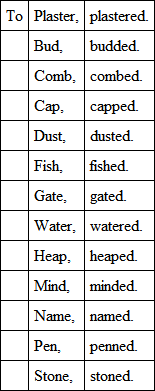
Very many of our time-words are unmoulded from the same cause – that they are names of things; although such names of things, having become worn more or less out of shape, or having fallen out of use, may not show themselves to our minds what they are.
To hunt makes hunted; why? From hound, to hunt, meaning at first to seek with a hound.
It may, however, be said, ‘Is to hunt from hound, or hound from to hunt?’
Such a point is, in very many cases, cleared out by the Anglo-Saxon, in which ‘to hunt’ is hunt-i-an, not hunt-an; and the i, a worn shape of ig, shows that huntian is from hund, hound, and so hound is not from hunt.
The time-word from the thing hunt-ig-an, hunt-i-an, is to houndy, to take time with a hound.
We say

But we should say ‘he ringed (not rung) his pig’; ‘he stringed his harp’; ring and string being things.
The strong or moulded time-words are nearly or quite all words ending in one single breath-penning, and of a close sound (1, 2, 3, or 4 of the Table), as
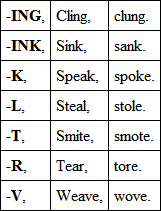
Other time-words, name-words, or stem-words, and broad-sounded ones (5, 6, 7, 8 of the Table), are nearly all weak or unmoulded.
Weak.
The ending -NG in broad-sounded words —

-NK, Broad.

And in

-K, Broad, Long Stem-words (weak).
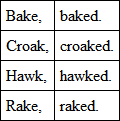
Make was heretofore maked:
‘For aevric rice man his castles makede.’ – Sax. Chron. MCXXXVI.
K wore out, whence
Maked, ma-ed, maed, made.
-K, Short.

-G, Short.

All but dig, dug. What a pity to put it out of keeping with all of the others! It is digged in the Bible.
-T, Long Stem-words.
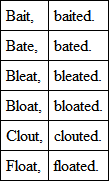
-T, Short Stem-words.

-TH.

-T, Short (weak shortened).

The wear of these words was thislike:
Let-ede.
Let-de.
The mild penning, d, after a hard one, t, became hard, t. Whence lette, let, with the two tt run into one. A pity!
So were shapen feed, fedde, fed; lead, ledde, led; read, redde.
Weak – D (long).

Weak – D (short).

-L, Broad Sound (long).

A few of them are shortened, as feel, feeld, felt.
-N, Long.

-N, Short Stem-words.

-R, Broad Sounds.

Dare now makes durst; but in Friesic it is unmoulded – ‘and ne thuradon nâ wither forskina’ (and dared not to show themselves again).
-R, Short.

-S and – Z, Long.
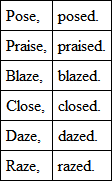
-SS.

-SH.

-P, Long.
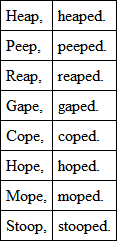
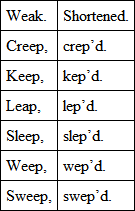
-P, Short.
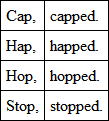
Weak – B (short).

-V, Long.

-F, Short.

-M, Long.

All but come, came.
Stub-roots.
Time-words ending in an open breathing. Most of them are weak: —
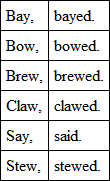
A few of them are moulded: —

All those that end in two or three sundry breath-pennings are weak: —

A few time-words ending with a throat-penning mark the heretofore time by some oddness of shape; as,

They were opened in sound, and also took the ending ode, od (our ed), and then came into our shapes by sundry wonted changes: —
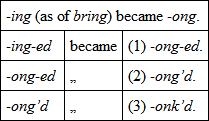
Then the d, a mild penning after a hard penning (k), became hard, t: —

as k and t are harsh together. Whence —
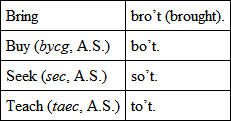
Our gh as in taught is the now unuttered (though still written) throat-penning.
Time-takings or time-givings may be taken as thing-marks, as ‘the hunting dog’; ‘the hunted hare.’
The sundry moods of time-takings are marked by sundry shapes of the time-word, or by bye-words or mark-words —shall, will, can, may, must.
The timings of time-takings are marked by sundry shapes of the time-word, and by bye-words or mark-words to it, as ‘the bird flies’ or does fly, or flew or did fly, or will fly.
Under-Sundrinesses of Time-takings
Time-takings are of sundry kinds, under sundry names, as to be, to walk, to strike.
Under-time-markings may be by single words, as ‘to write well or ill, slowly or quickly’; or by two or three words, as ‘he runneth very swiftly’; or by clusters of words, as ‘he runs with most amazing speed’; or ‘he works in a very skilful way.’
Fitting of the Time-word to all the cases of Person, Time, and Mood
In this fitting the time-word is helped by sundry bye-words or under-mark-words.
Can, from the Saxon cun-n-an, to ken, know, to know how. ‘I can write,’ I know how to write.
The heretofore time-shape of Ic can was Ic cuðe, for which we have now I could, with an l which was never in the root of the word, and for which there is not any ground.
May.—Mag-an, the stem of maht, might, means to strongen, to be or become strong (Lat. valere), as is shown by cases of its use in Saxon and other Teutonic tongues.
In an old Friesic good wish at the drinking to the health of a bride and bridegroom we find ‘Dat se lang lave en wel mage,’ that they long live and well may (strongen, bene valeant); and in Saxon, ‘Hu maeg he?’ how mays he? (strongens or valet).
Shall.—Sceal-an, meant, as a stem, to offmark, distinguish, or to skill in the meaning of 1 Kings v. 6 – ‘Ic sceal dón,’ I offmark or skill to do; as what I am bent to do.
‘Thou shalt love the Lord thy God.’ Thou markest or clearly seest to love the Lord thy God.
‘Thou shalt not steal.’ Thou markest this. Not to steal.
Must.—Mot-an, most-an, is most likely a stem of the word mag-an, to strongen (valere).
The -st would strengthen the meaning of mag (may) as it does in -est of longest. So ‘I must go’ (Ic moste gán) would mean ‘I am overmighted by another’s might to go.’
Time-words are fitted
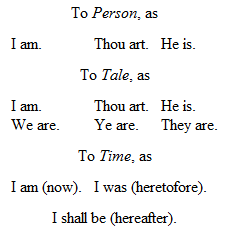
To Mood, as
I write, or shall write.
I may or can write, or might or could or should write.
If I write, or if I had written.
Things and Time-takings
Timing of time-takings is the marking of their times, as now, heretofore, or hereafter.
Time.
Now or hereat.
I am, or I love, or am loved.
Heretofore done.
I was, or I loved, or was loved.
Heretofore ongoing.
I was, or I was a-loving or I did love.
Now ended.
I have been, or I have loved, or have been loved.
Heretofore ended.
I had been, or I had loved, or had been loved.
Heretofore ongoing, ended.
I had been a-loving.
Hereafter doing.
I shall be, or I shall love, or shall be loved.
Hereafter ongoing.
I shall be a-loving.
Hereafter ended.
I shall have been, or shall have loved, or shall have been loved.
Hereafter ended, ongoing.
I shall have been a-loving.
Single and stringly time-takings of the same name, as ‘Mary sold me some apples yesterday.’ There was a single selling; but under the wording ‘Mary formerly sold apples in the market,’ it is clear that under the same word sold is meant a string of sellings.
So under the wording ‘Write your name’ is understood a single writing; but under the wording ‘If you would write readily, write every day,’ the same word write implies a string of writings.
Some tongues (as the Greek and Russian) have two shapes of the time-words for these two cases of time-taking; as, Greek —
‘Take thy bill and write fifty’ (γράψον, aorist). – Luke xvi. 6.
‘Jesus, stooping down, wrote on the ground’ (ἔγραφεν, imperfect, ondoing shape, wrote on).
See the Greek text of the 3rd Epistle of John v. 13 – ‘I had many (things or many times?) to write (γράφειν, ondoing shape), but I will not with pen and ink write (γράψαι) to thee’ (aorist, offdoing form).
An understanding of the difference between the aorist and ondoing shapes is of weight in the reading of the Gospel. ‘To make intercession, to intercede for them.’ – Heb. vii. 25. To intercede once for all, at the doom-day? No. To intercede on always; for the word is not in the aorist shape, but in the present ondoing form, to be interceding.

